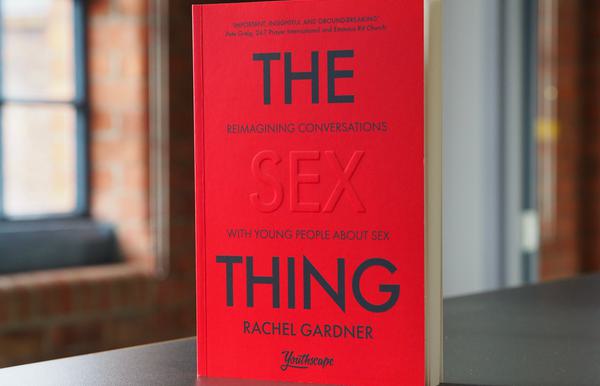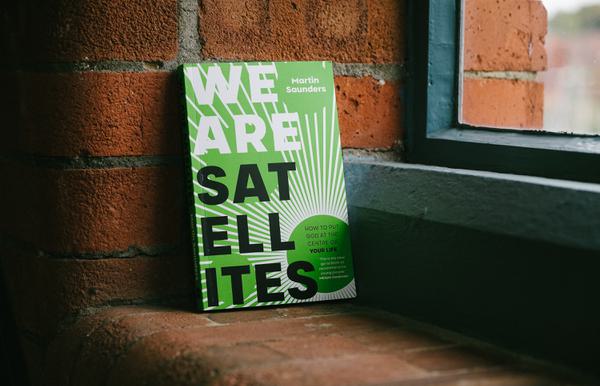Much has changed in the world of sex, relationships and young people in the past 20 years. Does Christian youth work still have anything to say, and do young people still want to talk about it?
Back in the early 2000s I travelled to Sweden to speak at a Christian youth festival. I was fresh off the TV (‘No Sex Please We’re Teenagers’ on BBC2) and churches were keen to ask this bold blonde from North London to talk to their youth about sex, which in those days meant purity, saying no, setting boundaries in premarital intimate relationships – all that jazz.
I was picked up from the airport by a son-of-a-YWAM-family who cast serious shade on my extroversion. All the way to the camp he waxed lyrical about his life, his faith, and his love-life. He’d obviously read up on the speaker he was picking up and he didn’t hold back. He told me about his first crush, his first kiss and his first experience of sexual intimacy – which incidentally had happened the night before at this very camp and why had I not already somehow guessed that from looking at the smile on his face!
I couldn’t square what I was hearing. Here was this YWAM kid, excitedly telling a guest speaker at an evangelical Christian youth camp about the premarital sex he was having. I felt confused. What was going on? Was he wanting to shock me? No – it really didn’t come across like that. Was he wanting my approval? No – it wasn’t that either. As I reflect on that mini-bus ride I can only think that he was simply telling me (who he knew cared about this topic) about this thing that felt so momentous to him. And he probably got a kick out of it too!
But it really unsettled me for the rest of the festival. What were people expecting me to say? Did any of these young followers of Jesus think like I did about sex? Were any of them wondering what the ‘one-flesh’ stuff that Jesus refers to in Mark 10.8 had to say about the meaning of sexual intimacy for them? What were they making of the teachings in the New Testament about fleeing sexual immorality and honouring God with their bodies? Did any of them think that not having sex outside of marriage was part of the deal?
I did my thing and went home, back into a context where churched young people’s most pressing questions around sex were to do with dating a non-Christian and whether God would forgive oral sex outside of marriage and is oral sex really sex because if it’s not really sex then it’s fine and not the sort of sex that God really hates and gets you into trouble. My few days in Sweden were probably the first time I’d noticed in a significant way that young followers of Jesus were thinking differently about a lot of things, especially sex.
Farewell, purity culture
My own adolescence coincided with a bit of a glory-time for church-based youth work in the UK. I knew of many churches in my area who had large youth groups (all led by parent-volunteers). We’d meet together for town-wide times of worship/eyeing up your future spouse. We weren’t the only church basking in the merchandise and messages of the emerging Christian youth subculture that was hell-bent on helping young people resist peer pressure. Fuelled by a desire to slow down young people’s acceleration into the dangerous world of sexual exploration, books like I Kissed Dating Goodbye by Joshua Harris, and movements like The Silver Ring Thing and True Love Waits were jumped upon by many Christian parents and leaders as magic bullets to protect their young people. They presented powerful codes of behaviour around dating, virginity, sex and the importance of chastity that quickly became ingrained in the normal narratives of church engagement with young people. In the UK, Steve Chalke’s ‘Don’t touch what you haven’t got’ added to the zeal of sexual abstinence that was to shape for the next decade many churches’ communication to young people about sex. But for all this interest in the sexual pressure on young people, I’m not sure how well me and my peers were being engaged in our sexual development, let alone connecting that with our unfurling Christian faith identity.
"Rapid advancements in sex-tech and changing societal attitudes aren’t simply reaching young people in our churches, they’re discipling young people in our churches."
That was many years ago, in the days before Snapchat, WhatsApp, Twitter, Instagram, TikTok and online porn. Before the dip in teen pregnancy rates. Before the #MeToo and Black Lives Matter movements. Before we knew what CSE, RSE, FGM and TERF meant. Before groups like Fight the New Drug and Naked Truth were using an evidence-based approach to show how accessing online porn rewires the adolescent brain and recalibrates society’s understanding of intimacy. Before #JKdoesntspeakforme. Before Cardi B.
The Sex thing: where do we start?
Youth culture has shifted and continues to shift. Rapid advancements in sex-tech and changing societal attitudes aren’t simply reaching young people in our churches, they’re discipling young people in our churches. It’s right that we’re increasingly aware of the role the church has played in side-lining sexual minorities and shaming people for stepping outside of a biblically historic view of sex. But I wonder if in our desire to avoid presenting a damaging narrative to an emerging generation, we’ve lost something of the focus and conviction our own youth pastors had in wanting to guide us onto the right path through all this stuff. Have we surrendered conversations about sex because they’re too complicated? Or maybe we’ve just succumbed to the idea that chats about Jesus and sex are just irrelevant to young people’s lives now.
When I wrote ‘The Sex Thing’ I sent it to a few youth leaders to see what they thought (and to snag some cheeky recommendations). A lot of people said thank you but no they didn’t want to put their name to it. Why? Because it either felt too risky or pointless in trying to do anything in this area. ‘I don’t think we can claw things back,’ one youth leader told me. ‘Sex genuinely isn’t something the young people I meet want to talk with me or the church about. It’s just not even on their radar that Jesus might have different views to them on sex. I don’t see where I would even begin with this.’
"We’re serving a generation who taste loss at every turn. They’ve lost key years to covid. They’ve lost certainty to the upheaval of global politics. They’re expected to develop a profound vocabulary to define their inner world. Their great adventure is into their ‘true selves’ and it’s often a very lonely journey."
Is this true? If I think about my own youth work here in Blackburn it would be true to say I’m having fewer conversations with young people about unplanned (or wanted) pregnancies or STIs. In fact, I can’t remember the last time I said the word ‘chlamydia’ in a young person’s hearing. I’m also very rarely in conversations with young people about what Jesus thinks about porn or how to set God-honouring boundaries in their intimate relationships. Maybe this is because we’re a youth resourcing church plant that’s reaching young people in school years 6-9 on a deprived estate in the North of England. But this change hasn’t happened overnight. For the past ten years or so I’ve found myself more likely to be sat on a Sunday morning with a few young people as they tell me about a sexually abusive message they’ve got on social media, or their admiration for a local TikTok celebrity who posts loads about what makes his polyamorous relationships work.

Stuck in the middle
Then there are always the quieter ones in the group who have long since realised that everything their parents think about sex, sexuality, gender, you name it, would put them at total odds with the views of their entire peer group and global youth culture. So, they stay silent in school, on the streets and even in church. It’s not that what the Bible may or may not teach about sex is irrelevant to their lives per se (many might want to know), it’s just that they’ll never be as ‘conservative’ as their parents and as ‘liberal’ as their peers and what does the middle ground look like when the two sides you have to live in peace with endlessly seek to ‘cancel’ each other and are suspicious of anyone seeking nuance. Could the radical holiness that previous generations have defined as sexual abstinence, be being redefined by this generation of Jesus followers as radical compassion for sexual minorities the church has kept far from God’s table? And if so, how might the story of personal obedience to the teachings of Jesus take hold in a young disciple’s imagination? What would inspire ‘Generation Justice’ to bring their sexual selves to Jesus, not because they want to be affirmed, but because before all else they want to be Christ’s?
Being sexual
Whether this resonates with you not, I have a hunch we’re all experiencing a reluctance among Christian leaders to chat with young people about sex. But here’s a thought. Is it such a bad thing that the conversations have shifted significantly away from chats about having (or not having) sex, and towards what it means to be sexual? If, as is widely acknowledged, there’s less penetrative sexual activity among young generations (thanks in part to online technologies), now is the prime time to engage well in conversations about what it means to be healthy, godly, sexual creatures. And beyond that, to help young people to explore what it means to be creatures made by a Creator who has sculpted their existence out of clay and breathed divine breath into them.
In the end, that’s what any conversation about sex has always been about anyway. Identity. Purpose. Destiny. Meaning.
We’re serving a generation who taste loss at every turn. They’ve lost key years to covid. They’ve lost certainty to the upheaval of global politics. They’re expected to develop a profound vocabulary to define their inner world. Their great adventure is into their ‘true selves’ and it’s often a very lonely journey. No wonder they crave a transcendence that makes sense of this, a being who can hold everything together, even as they fear the surrender this reality would demand. A teenager I met on the street today told me, ‘I really want there to be a God. I want something to be bigger than all of this and to be out there when I die. I just don’t know what I’d do if he was real though.’
So, what do we do? Should we engage young people in conversations about sex? And if so, how?
Let us know what you think! You can more from Rachel Gardner on this conversation in her new book The Sex Thing: Reimagining conversations with young people about sex. You can get it on the Youthscape Store here.










